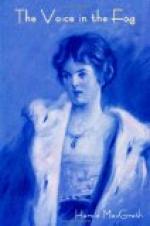My young poet had “signed on” under the name of Thomas Webb. It was not assumed. For years he had been known in the haberdashery as Webb. There was more to it, however; there was a tail to the kite. The English have an inordinate fondness for hyphens, for mother’s family name and grandmother’s family name and great-grandmother’s, with the immediate paternal cognomen as a period. Thomas’ full name was a rosary, if you like, of yeomen, of soldiers, of farmers, of artists, of gentle bloods, of dreamers. The latest transfusion of blood is always most powerful in effect upon the receiver; and as Thomas’ father had died in penury for the sake of an idea, it was in order that the son should be something of a dreamer too. Poetry is but an expression of life seen through dreams.
His father had been a scholar, risen from the people; his mother had been gentle. From his seventh year the boy had faced life alone. He had never gone with the stream but had always found lodgment in the backwaters. There is no employment quieter, peacefuller than that of a clerk in a haberdashery. From Mondays till Saturdays, calm; a perfect environment for a poet. You would be surprised to learn of the vast army of poets and novelists and dramatists who dispense four-in-hands, collars, buttons and hosiery six days in the week and who go a-picnicking on the seventh, provided it does not rain.
Thomas had an idea. It was not a reflection of his lamented father’s; it was wholly his own. He wanted to be loved. His father’s idea had been to love; thus, humanity had laughed him into the grave. So it will be seen that Thomas’ idea was the more sensible of the two.
The voyage was uneventful. Blue day followed blue day. When at length the great port of New York loomed in the distance, Thomas felt a thrilling in his spine. Perhaps yonder he might make his fortune; no matter what else he did, that remained to be accomplished, for he was a fortune-hunter, of the ancient type; that is, he expected to work for it. Shore leave would be his, and if during that time he found nothing, why, he was determined to finish the summer as a steward; and by fall he would have enough in wages and tips to give him a start in life. At present he could jingle but seven-and-six in his pocket; and jingle it frequently he did, to assure himself that it was not wearing away.
An important tug came bustling alongside. By the yellow flag he knew that it carried the quarantine officials, inspectors, and a few privileged citizens. Among others who came aboard Thomas noted a sturdy thick-chested man in a derby hat—bowler, Thomas called it. Quietly this man sought the captain and handed him what looked to Thomas like a cablegram. The captain read it and shook his head. Thomas overheard a little of their conversation.
“You’re welcome to look about, Mr. Haggerty; but I don’t think you’ll find the person you seek.”




